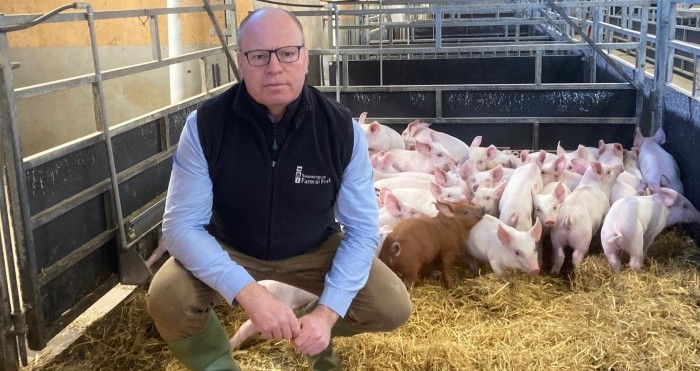The situation on farms is an ‘absolute nightmare’ and is getting worse, rather than better, according to NPA chairman Rob Mutimer, who, ahead of today’s crisis summit, has explained why the industry so desperately needs support from the Government and supply chain.
For the past six months or more, producers have been battling with serious animal welfare, logistical, financial and mental health crises simultaneously.
The numbers around the crisis are stark, with the backlog now estimated to be in excess of 200,000 pigs. The NPA has heard of 35,000 healthy pigs culled and destroyed so far, although this is likely to be an underestimate, and of 40 independent producers that have left the industry.
Official Defra December survey figures suggest the English female breeding herd was down by 22,000 year-on-year in December, although the NPA believes the true figure is higher.
But Mr Mutimer said the most salient figure is AHDB’s average carcase weights, which have recently topped 95kgs at the end of the month, 9.5kg above typical levels of recent years.
“That tells you that there are a huge number of pigs on farms that are way overweight, with many more to come through the system, and some a long way above that average weight,” he said in a recent Pig World interview.
Then there is the financial situation, with feed wheat still in excess of £215/tonne, and no immediate prospect of it coming down, and pig price dipping below 140p/kg. Producers lost around £25/pig produced in 2021, an unsustainable deficit that is set to grow in the first part of this year. “Our cost of production is higher than it’s ever been and the pig market price is 50p/kg below where it needs to be,” Mr Mutimer added.
But the numbers only tell part of the story when it comes to what producers are going through. “A lot of us have been overstocked for nine of the past 12 months and for independent producers, this is now an absolute nightmare,” he told Pig World.
“I fear a lot of producers are seriously depressed. Even if you take away the massive financial hit, the mental hit of this now is just unbearable for a lot of people. I’ve had some really awful for telephone calls from some very distressed people.
“I have had producer after producer to producer phoning to say they have never been under such unbelievable stress on farm in holding these pigs, and a lot of people have not been able wash down in between batches or do any of their usual protocols for six months.
“For many producers, 30% of pigs are being rolled every single week. We’ve got hundreds of thousands of contracted pigs stuck on farm, and that has gone on since August.”
Mr Mutimer said he knew of one producer who has got over 10,000 contract-placed pigs on his farms that should have gone for slaughter, but haven’t.
“It is horrendous for the staff, financially crippling and cash flow is a disaster. It’s absolutely intolerable,” he said.
Strain showing
Mr Mutimer’s own outdoor unit in Norfolk has, like so many others, had pigs backed on farm, and, while he has managed to cope logistically, with forecasts suggesting the backlog will remain until the summer if nothing changes, the strain is showing. “We are all holding three weeks of pigs that should not be there. We can cope for three weeks, but not a year,” he said.
There is huge frustration across the industry that, while the reasons for the backlog lie in a shortage of butchers in pork plants, due mainly to the new tougher post-Brexit immigration policy, the Government and supply chain have done so little to help. Processors are routinely not taking contracted numbers, while producers continue to receive discounted prices for pigs that are overweight as a result.
Speaking ahead of today’s crisis summit, Mr Mutimer accepted that pork plants have suffered in recent weeks with large numbers of Omicron-linked absences, affecting their short-term ability to take more pigs and cut the backlog. But he is struggling to see any longer-term plan.
“In reality, the measures that Defra Secretary George Eustice tried to implement three months ago to help the sector are not working at all, and the problem has got worse, rather than better.
“We want Government to relook at how we get labour into this country to get ourselves out of this mess. Brexit was about controlling our borders, not just stopping anybody coming in, but the Home Office has made it unbelievably difficult for processors to get people in.
“We want George Eustice to put in place measures that actually will attract the attention of the processors, but it’s also got to come with the caveat that, if they get this this help, they have got to undertake to take contacted pigs off farms in a short period of time.
“We’re getting no direct help at all at the bottom. We need a plan for getting people back to work in pork plants and getting the backlog down.
There is not much more we can take and we desperately other people to recognise that. We are now on limited time, and we need some clear thinking and real action soon.
“This is why it’s so important to get all members of the supply chain together – because if we don’t, and we don’t find some solutions, the whole supply chain is going to completely fall apart in the next three months.”




